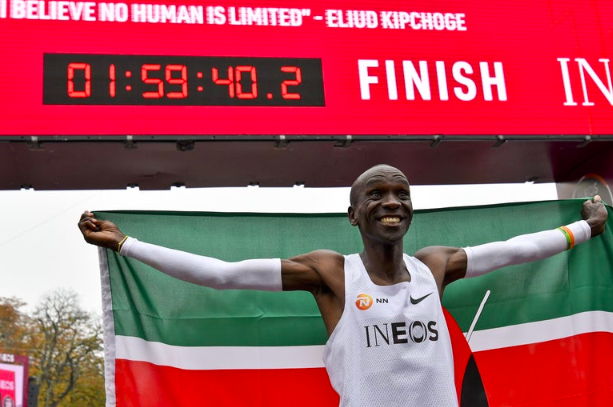Eliud Kipchoge’s Incredible Feat
October 15, 2019
After years of training and dedication, Eliud Kipchoge has broken the 2-hour marathon, running 26.2 miles in 1 hour, 59 minutes, and 40 seconds. He himself has commonly used the phrase “no human is limited” and he once again proved this to be true on Saturday in Vienna.
This was not Kipchoge’s first attempt to specifically break two hours in the marathon. In the Berlin Marathon 2018, Kipchoge set the official world record marathon clocking in an impressive time of 2 hours, 1 minute, and 39 seconds. Perhaps the most impressive part of this time was that after the first mile of the race, Kipchoge was in the lead by a considerable distance, and within the first few miles, all competitors were completely out of sight. This means that Kipchoge ran at this pace completely by his own judgment, and still came in shockingly close time to the two-hour barrier. Ineos and Nike both worked together to allow help Kipchoge run this marathon time.
In 2016, Nike attempted something very similar to what Ineos attempted and achieved on Saturday. In the “Breaking 2” project, Nike had Kipchoge and other esteemed marathoners try to break the two-hour marathon. They used a formation of pacesetters in which Kipchoge could draft, and an electronic pacing car making it virtually impossible for pacesetters to fall off the pace. Both of these were two major facilitators that Ineos employed when helping Kipchoge break the two-hour barrier. In the “Breaking 2” project, Kipchoge finished only 25 seconds off of the two-hour barrier. Ineos had a very similar approach to allow Kipchoge to run a marathon in under two hours, and it was accomplished this time, due to a combination of new shoes developed by Nike for marathon runners, a new formation by pacesetters to allow less energy expenditure, and a course in Vienna with fewer turns. Nonetheless, the main factor of success was Kipchoge himself, specifically his attitude toward the marathon, which he believed was a very possible accomplishment.
I personally believe a sub-two-hour marathon will become commonplace within the next decade, even without the use of pacesetters and an electronic pacing car. When looking at running under four minutes in the mile, it was believed by many to be impossible, and when it was achieved, many people achieved it in the decade to follow. Today, there are thousands of athletes who can run a mile in under four minutes. I believe the same will occur with the marathon. Nonetheless, Kipchoge made history on Saturday, and his accomplishment will be an inspiration to many aspiring athletes.

